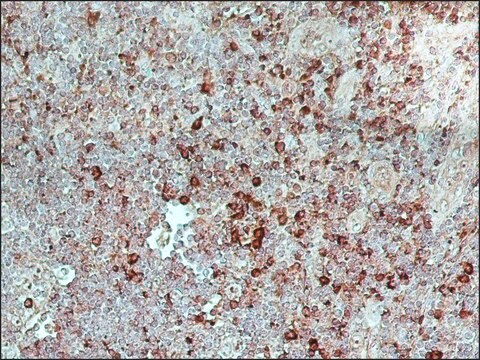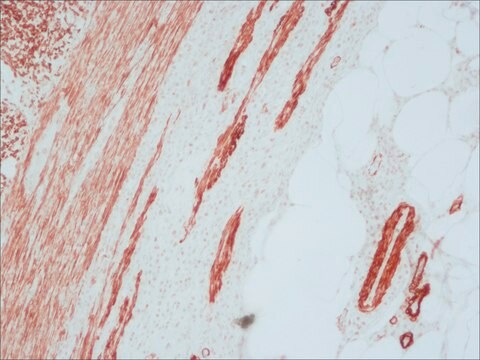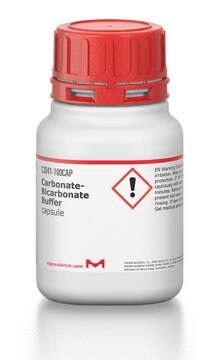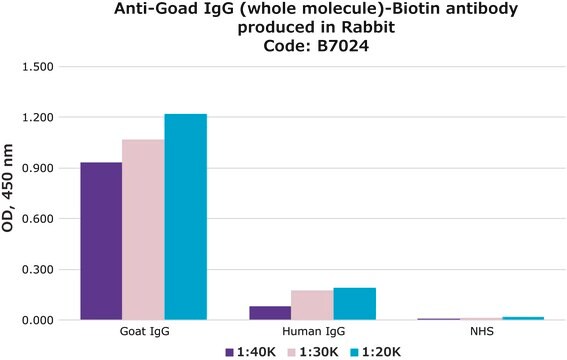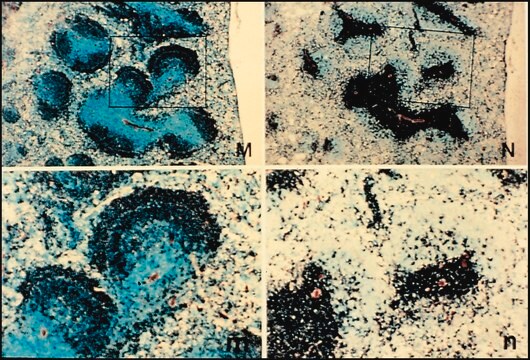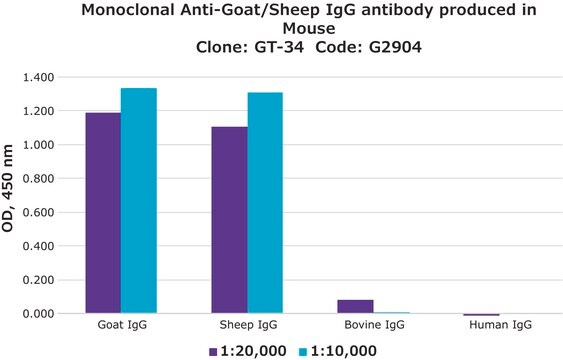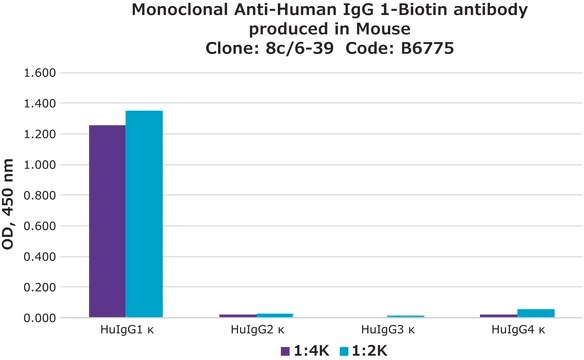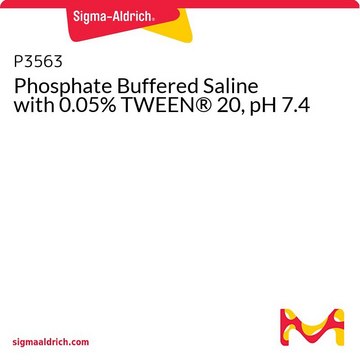B7014
Anti-Goat IgG (whole molecule)–Biotin antibody produced in rabbit
affinity isolated antibody, buffered aqueous solution
Autenticatiper visualizzare i prezzi riservati alla tua organizzazione & contrattuali
About This Item
Prodotti consigliati
Origine biologica
rabbit
Coniugato
biotin conjugate
Forma dell’anticorpo
affinity isolated antibody
Tipo di anticorpo
secondary antibodies
Clone
polyclonal
Stato
buffered aqueous solution
tecniche
direct ELISA: 1:20,000
Temperatura di conservazione
−20°C
modifica post-traduzionali bersaglio
unmodified
Cerchi prodotti simili? Visita Guida al confronto tra prodotti
Descrizione generale
An immunoglobulin has two heavy chain and two light chain connected by disulfide bond. It is a glycoprotein. IgG is a major class of immunoglobulin. Goat IgG has two subclasses- IgG1 and IgG2.
Goat IgG is often used for the detection and study of various proteins such as EPAS1 and MIP-3 α among several others. Anti-goat IgG (whole molecule)-Biotin antibody can be used as a secondary antibody to facilitate the detection of such target proteins bound to goat IgGs by immunological assays . Thus, anti-goat IgGs are useful tools for the analysis of target proteins. Anti-Goat IgG (whole molecule)-Biotin antibody is specific for IgG in goats.
Immunogeno
Goat IgG
Applicazioni
Anti-Goat IgG (whole molecule)-Biotin antibody produced in rabbit has been used:
- immunohistochemistry
- immunostaining
- western blot
- immunofluorescence
- immunohistochemical studies
Azioni biochim/fisiol
Immunoglobulin G (IgG) participates in hypersensitivity type II and type III. It mainly helps in immune defense.
Stato fisico
Solution in 0.01 M phosphate buffered saline, pH 7.4, containing 1% bovine serum albumin and 15 mM sodium azide
Esclusione di responsabilità
Unless otherwise stated in our catalog or other company documentation accompanying the product(s), our products are intended for research use only and are not to be used for any other purpose, which includes but is not limited to, unauthorized commercial uses, in vitro diagnostic uses, ex vivo or in vivo therapeutic uses or any type of consumption or application to humans or animals.
Non trovi il prodotto giusto?
Prova il nostro Motore di ricerca dei prodotti.
Codice della classe di stoccaggio
10 - Combustible liquids
Classe di pericolosità dell'acqua (WGK)
nwg
Scegli una delle versioni più recenti:
Possiedi già questo prodotto?
I documenti relativi ai prodotti acquistati recentemente sono disponibili nell’Archivio dei documenti.
Diana Borenshtein et al.
Genome biology, 9(8), R122-R122 (2008-08-06)
Comparative characterization of genome-wide transcriptional changes during infection can help elucidate the mechanisms underlying host susceptibility. In this study, transcriptional profiling of the mouse colon was carried out in two cognate lines of mice that differ in their response to
Monoclonal Antibodies: Principles and Practice (1996)
Patrick Pollard et al.
The Journal of pathology, 205(1), 41-49 (2004-12-09)
The Mendelian tumour syndromes hereditary leiomyomatosis and renal cell cancer (HLRCC) and hereditary paragangliomatosis with phaeochromocytomas (HPGL) result from mutations in nuclear genes (FH and SDHB/C/D, respectively) that encode Krebs cycle enzymes. HPGL tumours are highly vascular and there is
J F Parkinson et al.
The Journal of biological chemistry, 265(21), 12602-12610 (1990-07-25)
Thrombomodulin is an endothelial cell membrane protein which plays a central regulatory role in the protein C anticoagulant pathway. The human thrombomodulin intronless gene was isolated from a genomic DNA library and used to isolate the coding region. A mammalian
Molecular Genetics of Immunoglobulin, 17 (1987)
Il team dei nostri ricercatori vanta grande esperienza in tutte le aree della ricerca quali Life Science, scienza dei materiali, sintesi chimica, cromatografia, discipline analitiche, ecc..
Contatta l'Assistenza Tecnica.